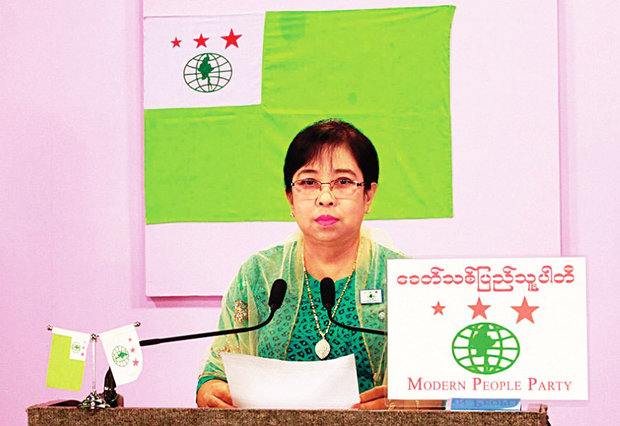DVB spoke to Yi Yi Sa, the Modern People’s Party’s Lower House candidate in Kawhmu Township, Rangoon Division, the same township as opposition leader Aung San Suu Kyi, about her campaign preparations and hopes for her constituency.
Red Flag communist leader Thakin Soe formed the Modern People’s Party (MPP), after the dissolution of the Unity and Development Party after the 1990 election. The MPP is fielding 25 candidates in the upcoming 8 November election – seven in the Lower House and 18 in regional parliaments.
Question: The 60-day election campaign period has officially kicked off. Where is the Modern People’s Party focusing their campaign?
Answer: We have launched campaigns in Rangoon, Irrawaddy and Pegu [Bago] divisions. On Thursday, 17 September, the MPP held campaign rallies in Rangoon’s Hlegu Township. I am currently campaigning in Kawhmu.
Q: In the 2012 by-elections, you ran as a candidate in Wakema, Irrawaddy Division. However, this year you are competing in Kawhmu. Why the change?
A: For background, the MPP evolved from the Unity and Development Party that ran in the 1990 election. Back then, the party’s joint-general secretary U Hla Myint stood as a candidate in the polls. In the 2010 election, the MPP fielded two candidates for the regional parliament, and one each for the upper and lower houses.
Initially, I had not planned to stand for election this year. However, some voters in Kawhmu approached me, and urged me to contest the seat. We had originally appointed another female party member, a lawyer, to stand as the candidate for Kawhmu. However, she was rather inexperienced, as she only had been involved in politics for about five or six years. At the last minute on 14 October, before the candidate submission deadline, I was appointed the candidate for Kawhmu, after the party’s central executive committee made the final decision.
Q: You will be facing off against four other candidates, including National League for Democracy (NLD) opposition leader Aung San Suu Kyi. How have you prepared for the election?
A: Freedom to participate in elections is a democratic right. In a democracy, everyone is entitled to choose a constituency. We consider what we can do for the country and people when we choose our constituencies; we do not base our decisions on who we will be facing.
Q: What do you think people in Kawhmu need the most?
A: People in Kawhmu rely on farming and taking on additional jobs for their livelihoods. If we can bring foreign investment and economic development to the region, we can create local jobs that provide security to the population.
In addition, as most of the constituents are farmers, we should work to provide them with low-interest, long-term loans through the government banks.
Q: In past elections, the MPP has not won a single parliamentary seat. What have you learned from that to ensure a win this time?
A: It also had to do with the election commission. Our country was not very familiar with the democratic process back in 2010, and it was the first assignment for the Union Election Commission back then. There were a lot of irregularities and errors on top of many other things, which I think is why we didn’t win.
In the 2012 by-elections, the people of Burma were longing for a saviour – someone capable, to replace the existing government. They were hoping that a certain party who they saw as their saviour would be able to do better work. This kind of mentality, of desperately longing for a saviour, is common in impoverished countries with slow development. But we cannot blame the people for that.
As for the upcoming elections, it is hard to tell what the people have in their minds. But it is up for the consumers to decide whether a pudding is good or not, it is not for the pudding maker to decide. So we should let the people make their choice freely.
[related]
Q: Do you think the 2015 elections will be free and fair? What is your opinion on the irregularities in the most recent voter list?
A: I think the arrangement so far by the Union Election Commission is pretty thorough –they are taking advice from international polling experts and cooperating with civil societies and NGOs, as well as inviting these organisations to monitor the election, so I very much believe the upcoming elections will be free and fair.
Q: The MPP announced in its televised campaign speech their intention to gradually reduce number of military representatives in the parliament until there are no more. Why do you think this is necessary?
A: We believe that the military’s entitlement [in the 2008 Constitution] to 25 percent of parliamentary seats was meant as a means of preventing a military coup, as the country made its first steps towards democracy. But once we have a strong democracy, I don’t think the soldiers will want to stay in the parliament even if we beg them to. We believe that soldiers shouldn’t be in the parliament, as their main duty is to protect the country,
Q: If the MPP candidates win parliamentary seats, will they side with the ruling-USDP or the opposition?
A: We see everyone as our fellow country builder regardless of his or her party. But we shouldn’t hesitate to criticise anyone if necessary, however we will stick to constructive criticism. We are willing to work with anyone regardless of party for the good of the country and people.
USDP candidate Soe Tint won his seat in Kawhmu comfortably, with 42,176 votes. His closest rival from the National Unity Party, Ohn Thaun, received 13,944 votes.
Read an interview with NDP’s candidate for Kawhmu here.
Full DVB coverage of the 2015 election here.



